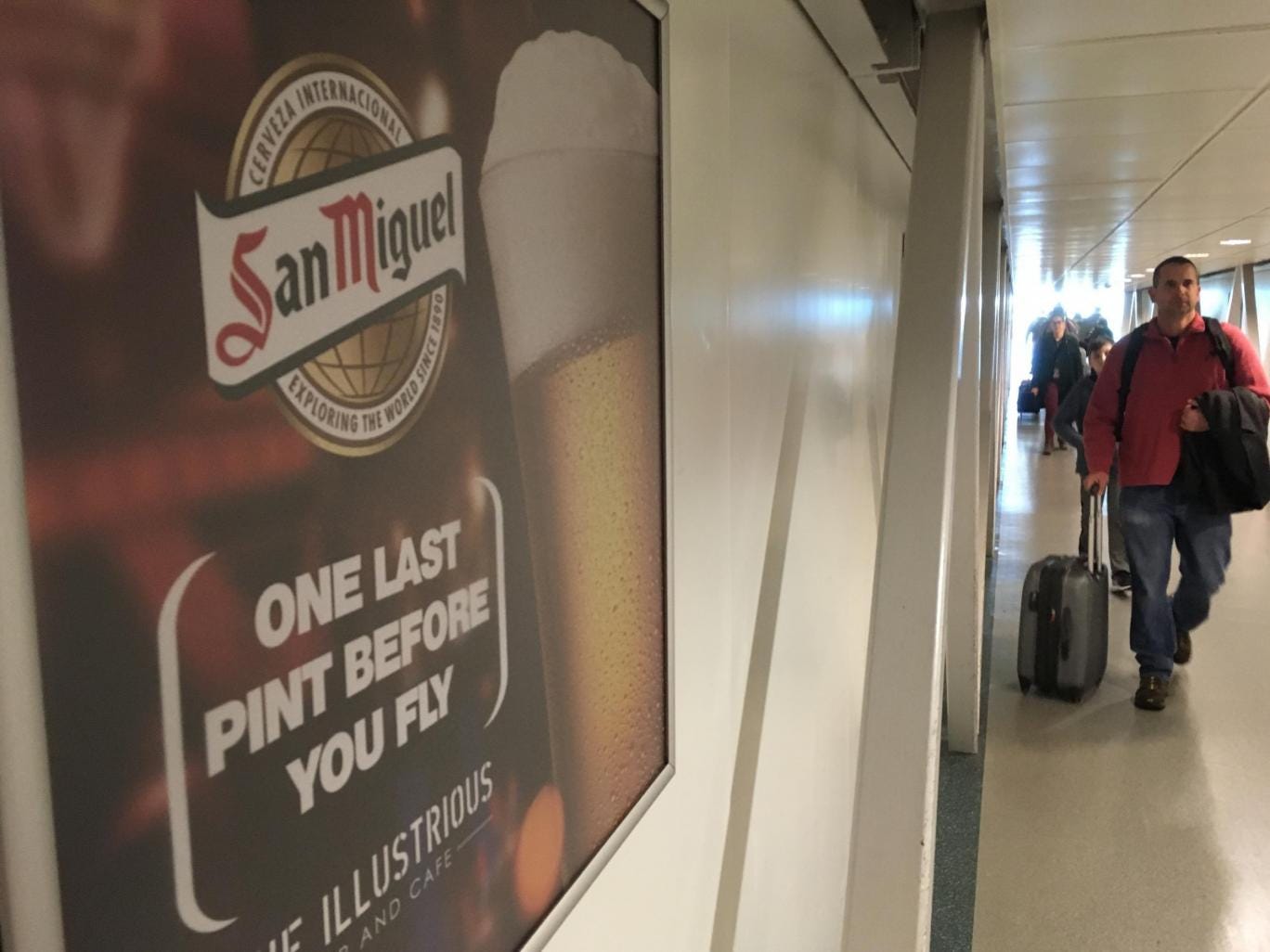DRINK-FUELLED AIR RAGE STILL THREATENING SAFETY, SAY CABIN CREW

Last orders: an advert at Stansted airport departures area urges passengers to enjoy 'one last pint before you fly' / Simon Calder
'The abuse cabin crew have to contend with in doing their job would not be tolerated in any other industry or walk of life'
A year on from a new code of conduct designed to curb drunkenness on planes, cabin crew report it has had little effect.
The voluntary code was agreed between the police, airlines, airports and airport retailers to "minimise disruptive passenger behaviour".
But the Unite union, which represents 30,000 UK cabin crew, says a major survey of members showed more than three quarters had witnessed alcohol-fuelled air rage since the new rules took effect in July 2016. And fewer than one in four who were aware of the rules said it had helped to reduce drunken and disruptive behaviour.
The Air Navigation Order states: "A person must not enter any aircraft when drunk, or be drunk in any aircraft."
Under the UK Aviation Industry Code of Practice on Disruptive Passengers, airlines, airport bars and retailers agree not to sell alcohol to passengers "they believe to be intoxicated or encourage excessive alcohol consumption". The agreement also stipulates: "Retailers will advise passengers not to open and consume alcohol before or during their flight."
But Unite says the code is not working. Since it took effect, 78 per cent of cabin crew say they have witnessed "disruptive passenger incidents". More than one in 10 said the behaviour had threatened flight safety.
Unite's national officer for civil air transport, Oliver Richardson, said: "The abuse and disruptive behaviour cabin crew have to contend with in doing their job and ensuring passenger safety would not be tolerated in any other industry or walk of life.
"The industry and the Government need to recognise that the code of conduct must be given teeth, look at factors such as levels of alcohol consumption prior to flight departures, as well as tougher penalties for the perpetrators of such behaviour."
According to the Civil Aviation Authority there were 421 incidences of disruptive passengers at UK airports in 2016, with the majority involving drunkenness.
Getty
A BBC report said 387 people had been arrested in the year to February 2017, up from 255 in the previous 12 months.
The statistics came from 18 UK regional police forces with a major airport in their area.
More than half of UK cabin crew who responded to a survey organized by the BBC and the Unite trade union, which represents many flight attendants, said they had witnessed disruptive drunken passenger behavior at UK airports.
A total of 19,000 Unite members were surveyed and 4,000 responded, with one in five saying they had suffered physical abuse from drunken passengers.
The BBC survey comes on the heels of an IATA report in 2016 that identified a rise in more general bad behavior on airliners. Alcohol or drug intoxication was implicated in around a quarter of those incidents.
Ryanair said that most of a 600% leap in disruptive passenger incidents recorded by UK regulator the CAA in the UK between 2012 and 2016 involved alcohol to some extent and the airline urged airports to take more responsibility for serving alcohol.
It called for:
- A ban on the sale of all alcohol in bars and restaurants before 10 a.m.;
- Introducing the mandatory use of boarding cards when purchasing alcoholic drinks in airports and limiting to two the number of drinks per boarding card;
- Controlling the sale of alcohol to passengers during flight delays by again limiting the number of drinks per boarding pass to a maximum of two.
Ryanair bans passengers from UK regional airports Manchester and Glasgow Prestwick heading to the two Spanish destinations from bringing duty-free alcohol on board; those who have purchased duty-free alcohol must consign it to the aircraft hold or leave it behind.
“It’s completely unfair that airports can profit from the unlimited sale of alcohol to passengers and leave the airlines to deal with the safety consequences,” Ryanair chief marketing officer Kenny Jacobs said.
Another UK LCC, Jet2, last year banned alcohol on departures before 08:00 local time in an effort to limit bad behavior.
“This is a particular problem during flight delays when airports apply no limit to the sale of alcohol in airside bars and restaurants,” Jacobs said. “This is an issue which the airports must now address and we are calling for significant changes to prohibit the sale of alcohol at airports, particularly with early morning flights and when flights are delayed.”
A spokesman for the UK Airport Operators Association (AOA) told ATW it had introduced a voluntary code of practice in 2016 to tackle this problem. He said the AOA felt this was preferable to introducing more legislation to deal with the situation. Legislation could be a “blunt tool,” whereas a code of practice could be swiftly amended to take account of changing circumstances.
He said he was not aware of any particular reason for the sudden rise in drunkenness at airports and in aircraft, and suggested it could be a reflection of more general trends in society. He said there was a need for a “joined-up approach” to the problem: “People will drink before they get to the airport, at the airport and once they are on the aircraft.”



Ingen kommentarer:
Legg inn en kommentar
Merk: Bare medlemmer av denne bloggen kan legge inn en kommentar.